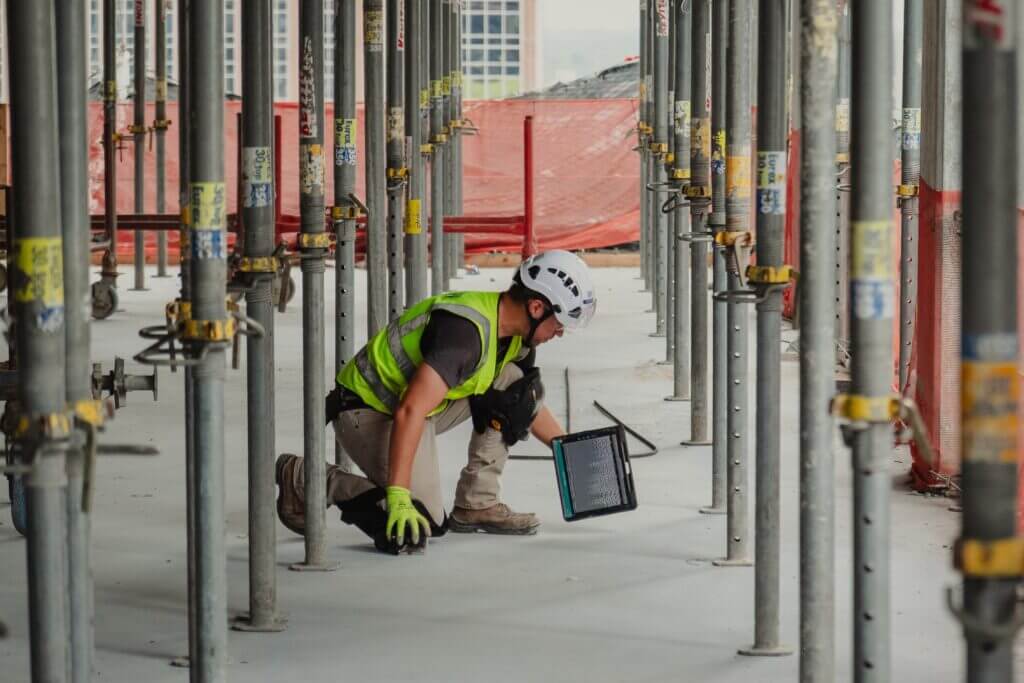How to Determine the Strength of Concrete

Concrete is the backbone of modern construction, offering excellent durability and strength in diverse applications. Building codes dictate concrete strength standards for various uses, so knowing the strength of your foundation, pillar, or wall is crucial for safety, avoiding repairs, and staying within budget. Ultimately, your concrete strength calculation determines whether you can move forward with construction or need to make adjustments first.
Types of Concrete Strength
The three types of concrete strength include the following:
- Compressive strength gauges the concrete’s ability to withstand loads that reduce its size. Measured in pounds per square inch (PSI), concrete compressive strength tests are typically conducted on cylindrical specimens at different curing stages, such as seven and 28 days.
- Tensile strength determines how concrete performs under tension. It measures the ability of concrete to resist breaking or cracking under pressure. This strength is typically a percentage of the compressive strength, often around 10%.
- Flexural strength, also known as bending strength, is important for concrete used in beams and roads, where the material is subjected to bending forces. It is determined by loading a concrete beam until it fails.
Factors Affecting Concrete Strength
Several variables influence the strength of concrete:
- The cement, sand, aggregate, and water ratio is foundational to achieving the desired strength.
- The amount of water is also important, as adding too much weakens the concrete mix.
- Mixing times affect strength, with over-mixed batches leading to excessive evaporation and weaker concrete. Yet under-mixed batches are also problematic, as they don’t hold together well.
- The curing period tells you about the concrete’s strength. If it dries out more slowly, it’s likely to be stronger in the long run.
- Temperature is also a factor. Extreme heat or cold during curing adversely affects the strength of concrete.
Concrete Strength Testing Methods
Various techniques can be used to test concrete strength:
- Field-cured cylinders involve casting concrete cylinders from the same batch used at the job site and curing them under the same conditions as the in-place concrete. These cylinders are then tested at specific curing intervals to ensure the required strength.
- The rebound hammer test is a non-destructive concrete strength testing method that uses a spring-driven hammer to measure the surface hardness of the concrete, correlating to its compressive strength. Though less accurate than other methods, it provides immediate results and is ideal for quick assessments or comparative analysis across different sections of a concrete structure.
- Core drilling is a definitive approach to measuring in-place concrete strength. It involves extracting cylindrical samples from existing concrete structures without causing significant damage. These cores are then subjected to compressive strength testing. Core drilling can also reveal other properties, such as the depth of carbonation, the presence of cracks, and the density of the concrete.
Why Choose Ashton Sawing and Drilling LLC?
After two decades in business, Ashton Sawing and Drilling LLC has become a leader in top-tier concrete services across Texas and Louisiana. We pride ourselves on accommodating projects of all sizes with quick turnaround times and competitive pricing. Our turn-key services ensure every project meets the highest standards of quality and safety. For reliable concrete strength testing or other concrete services in Dallas, Houston, New Orleans, or Baton Rouge, please contact us today.

